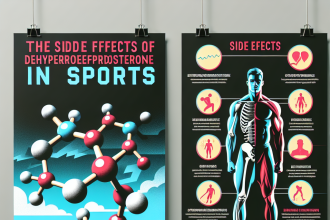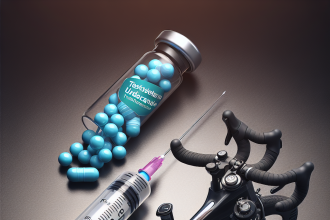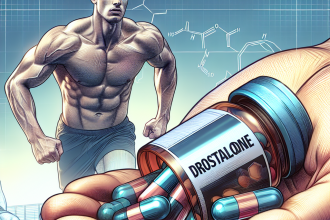-
Table of Contents
Unveiling Testosterone Enanthate: The Hidden Doping in Sports Supplements
The use of performance-enhancing drugs in sports has been a controversial topic for decades. Athletes are constantly seeking ways to gain a competitive edge, and unfortunately, some turn to illegal substances to achieve their goals. One such substance that has been gaining attention in the world of sports is testosterone enanthate, a synthetic form of the male hormone testosterone. While it is commonly used in medical treatments for conditions such as hypogonadism, it has also been found to be a popular choice among athletes looking to enhance their performance. In this article, we will delve into the world of testosterone enanthate and its use as a hidden doping agent in sports supplements.
The Basics of Testosterone Enanthate
Testosterone enanthate is a synthetic form of testosterone, the primary male sex hormone responsible for the development of male characteristics such as muscle mass, bone density, and body hair. It is commonly used in medical treatments for conditions such as hypogonadism, where the body is unable to produce enough testosterone on its own. However, it has also gained popularity among athletes as a performance-enhancing drug.
Testosterone enanthate is typically administered through intramuscular injections and has a long half-life of approximately 8 days. This means that it can remain in the body for an extended period, making it a popular choice for athletes looking to avoid frequent injections. It is also relatively inexpensive and easily accessible, making it an attractive option for those seeking to enhance their athletic performance.
The Effects of Testosterone Enanthate on Athletic Performance
The use of testosterone enanthate in sports is primarily aimed at increasing muscle mass and strength. It works by binding to androgen receptors in the body, stimulating the production of proteins and increasing the synthesis of muscle tissue. This results in an increase in muscle size and strength, which can give athletes a significant advantage in their respective sports.
Studies have shown that the use of testosterone enanthate can also improve athletic performance in other ways. It has been found to increase red blood cell production, which can improve oxygen delivery to muscles and enhance endurance. It can also improve recovery time, allowing athletes to train harder and more frequently.
However, it is important to note that the use of testosterone enanthate in sports is considered cheating and is banned by most sports organizations. Athletes who are caught using this substance can face severe consequences, including disqualification, suspension, and even legal repercussions.
The Hidden Doping in Sports Supplements
While the use of testosterone enanthate as a performance-enhancing drug is well-known in the world of sports, what is not as widely known is its presence in sports supplements. Many supplements marketed as natural and legal alternatives to steroids have been found to contain hidden doses of testosterone enanthate. These supplements are often marketed towards bodybuilders and athletes looking to improve their physique and performance.
One study found that out of 44 supplements marketed as natural testosterone boosters, 25% contained testosterone or its derivatives, including testosterone enanthate (Geyer et al. 2004). This is a concerning trend as these supplements are readily available and can be purchased without a prescription, making it easier for athletes to unknowingly consume banned substances.
Furthermore, the dosages of testosterone enanthate found in these supplements were often higher than what is considered safe for medical use. This puts athletes at risk of experiencing adverse effects such as liver damage, cardiovascular issues, and hormonal imbalances.
The Importance of Drug Testing in Sports
The presence of testosterone enanthate in sports supplements highlights the need for strict drug testing in sports. While athletes are ultimately responsible for what they put into their bodies, it is crucial for sports organizations to ensure that the supplements marketed to athletes are free from banned substances. This not only protects the integrity of the sport but also the health and safety of the athletes.
Drug testing in sports has come a long way in recent years, with advancements in technology allowing for more accurate and efficient testing methods. However, there is still room for improvement, and it is essential for sports organizations to continue to invest in research and development to stay ahead of those seeking to cheat the system.
In Conclusion
The use of testosterone enanthate as a hidden doping agent in sports supplements is a concerning issue that needs to be addressed. While it may provide short-term benefits in terms of athletic performance, the potential long-term consequences and the violation of fair play make it an unacceptable practice. It is crucial for athletes to understand the risks associated with using this substance and for sports organizations to continue to prioritize drug testing to maintain the integrity of sports.
References
Geyer, H., Parr, M. K., Koehler, K., Mareck, U., Schänzer, W., & Thevis, M. (2004). Nutritional supplements cross-contaminated and faked with doping substances. Journal of Mass Spectrometry, 39(2), 227-234.




